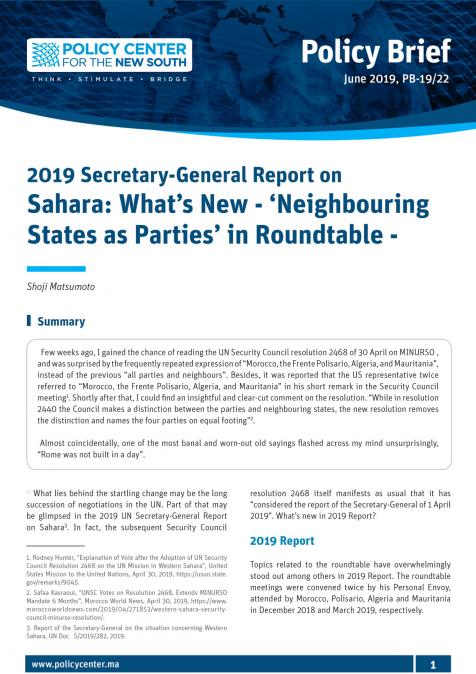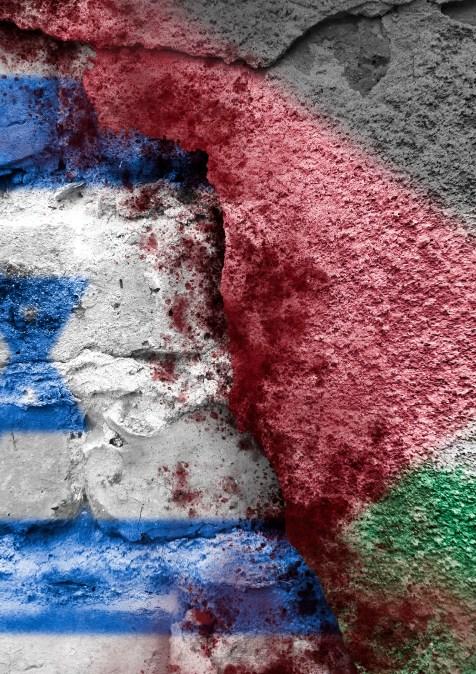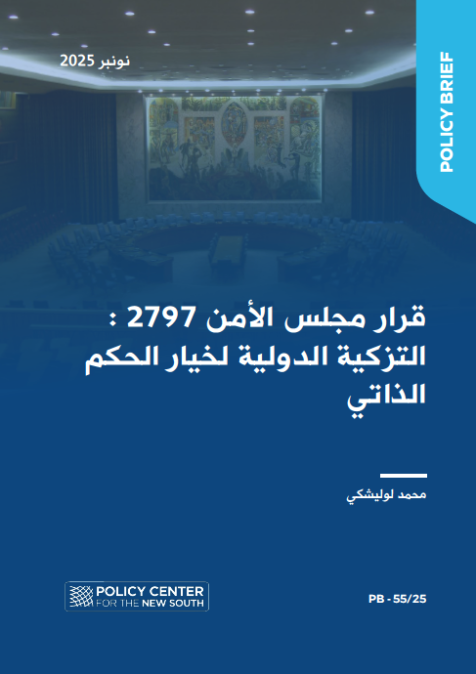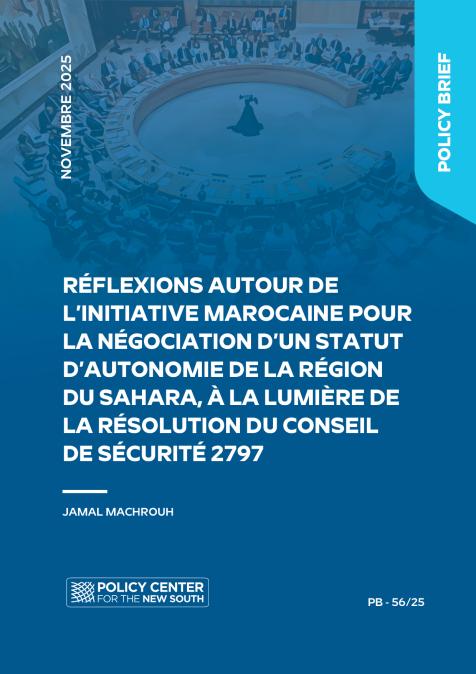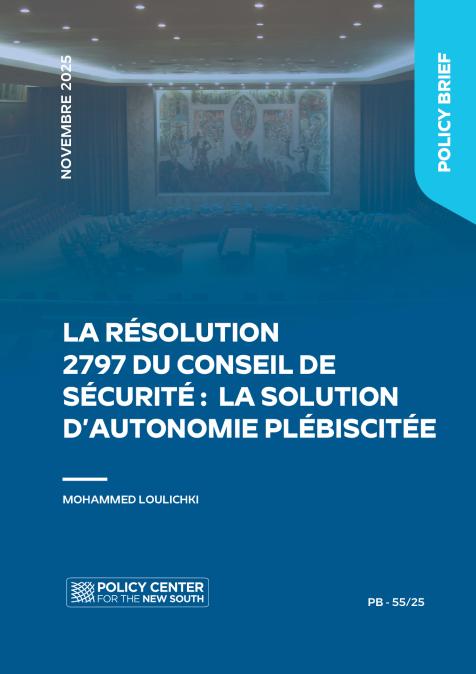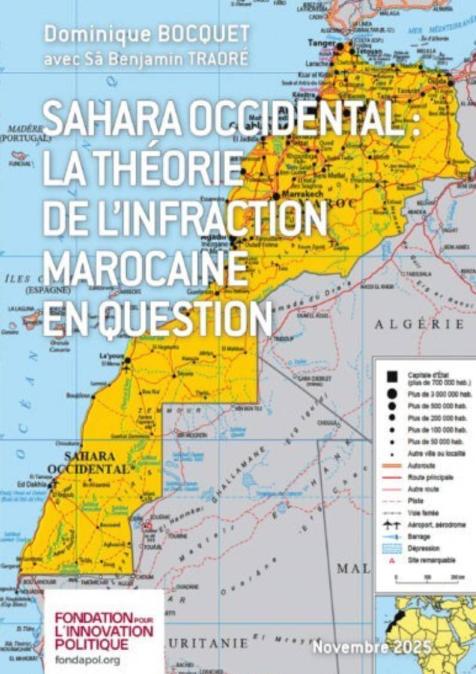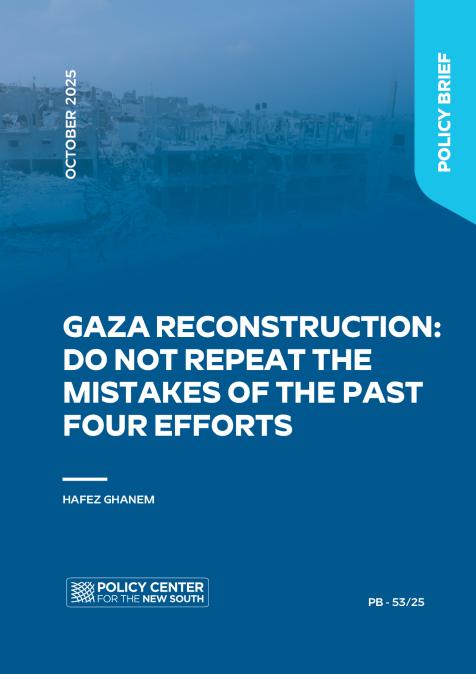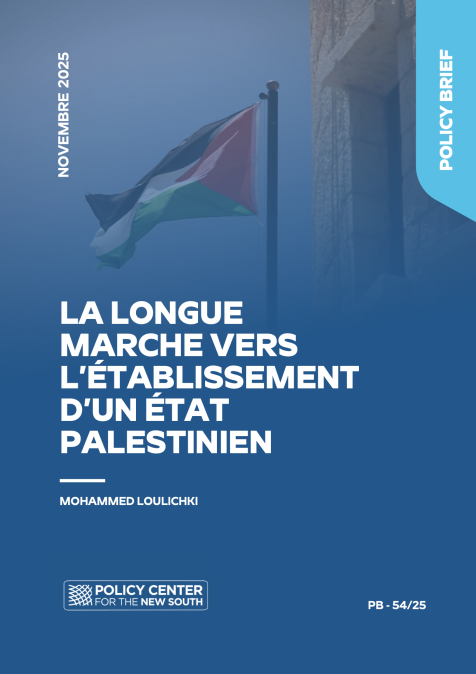Publications /
Policy Brief
Few weeks ago, I gained the chance of reading the UN Security Council resolution 2468 of 30 April on MINURSO , and was surprised by the frequently repeated expression of “Morocco, the Frente Polisario, Algeria, and Mauritania”, instead of the previous “all parties and neighbours”. Besides, it was reported that the US representative twice referred to “Morocco, the Frente Polisario, Algeria, and Mauritania” in his short remark in the Security Council meeting1. Shortly after that, I could find an insightful and clear-cut comment on the resolution. “While in resolution 2440 the Council makes a distinction between the parties and neighbouring states, the new resolution removes the distinction and names the four parties on equal footing”.
Almost coincidentally, one of the most banal and worn-out old sayings flashed across my mind unsurprisingly, “Rome was not built in a day”.
What lies behind the startling change may be the long succession of negotiations in the UN. Part of that may be glimpsed in the 2019 UN Secretary-General Report on Sahara . In fact, the subsequent Security Council resolution 2468 itself manifests as usual that it has “considered the report of the Secretary-General of 1 April 2019”. What’s new in 2019 Report?
2019 Report
Topics related to the roundtable have overwhelmingly stood out among others in 2019 Report. The roundtable meetings were convened twice by his Personal Envoy, attended by Morocco, Polisario, Algeria and Mauritania in December 2018 and March 2019, respectively.
The roundtable marked the first face-to-face encounters since 2012. Although negotiations could not produce tangible results, the roundtable process itself has produced an astonishing result of ‘Algeria as a party’ to the Sahara conflict, later implicitly confirmed in the Security Council meeting.
The roundtable was described as a symbol of the willingness of people of diverging positions to find a new way forward through dialogue. Indeed, it is proved that the roundtable process is one of the most realistic and practicable means to start dialogue between true parties, i.e., Morocco and Algeria. It is speculated that the third roundtable meeting would be held before summer.
Algeria as a Party
The roundtable process has resulted in a noticeable difference in the composition of the parties in the Security Council. In the roundtable process, not only Morocco and Polisario but also Algeria and Mauritania have become put on equal footing with each other as long as the UN-sponsored negotiations to achieve a political solution are concerned. Thus, the Security Council resolution 2468 reiterates its call upon Morocco, Polisario, Algeria and Mauritania to cooperate more fully with each other, and to strengthen their involvement in the political process and to achieve progress towards a political solution . In the Security Council resolution 2468, the phrase “all parties and neighbours” is once found, but it is in the context of welcoming their engagement with the Secretary-General’s Personal Envoy in his efforts to facilitate the roundtable meetings. In contrast, the previous Security Council resolutions have consistently distinguished Morocco and Polisario as the parties from Algeria and Mauritania as neighbouring States .
In 2019 Report, “all parties and neighbours” are still separated . But the phrase “Morocco, Polisario, Algeria and Mauritania” is found 5 times, because of the roundtable .
Morocco has stressed that a solution has to be “realistic” in conformity with the latest Security Council resolution , and underscored the need to draw lessons from past failed attempts, among which may be a referendum and an abortive proposal for MINURSO’s human rights monitoring, let alone ‘hide-and-seek’ with Algeria.
Roundtable
In the roundtable, the delegations expressed agreement over the high socio-economic cost of the conflict, highlighting that the prolonged conflict hampered cooperation, paralyzed economic development and jeopardized security in the entire Maghreb region. They further agreed on the urgent need to increase regional cooperation. There was consensus that the entire Maghreb region would greatly benefit from a solution to the conflict. According to 2019 Report, the “Personal Envoy was encouraged by this conversation, which he interpreted as an important aspect in the search for common ground between the parties and neighbours” (para. 17) .
Besides its return to the AU, Morocco called for an end to “division and lack of unity in the Maghreb”, proposing a joint political mechanism for dialogue and consultation between Morocco and Algeria “using an open-ended agenda, without conditions or exceptions”. The proposal is interpreted in 2019 Report as an important aspect in the search for common ground between the parties and neighbours. The proposal seems to have significantly contributed to produce the result of putting the parties and neighbours on equal footing in the Security Council .
Natural Resources
2019 Report also highlights the European Parliament’s amendment of the Protocols to the Euro-Mediterranean Agreement and the Fisheries Partnership Agreement, and extending their application to goods from southern provinces . In Polisario Front v. Council of the EU, the General Court of the European Court of Justice had declared in 2015 that Council Decision 2012/497/EU of 8 March 2012 on the conclusion of an Agreement in the form of an Exchange of Letters between the EU and Morocco concerning reciprocal liberalisation measures on agricultural products, processed agricultural products, fish and fishery products, the replacement of Protocols 1, 2 and 3 and their Annexes and amendments to the Euro-Mediterranean Agreement establishing an association between the EC and their Member States, of the one part, and Morocco, of the other part was annulled in so far as it approves the application of that agreement to Sahara .
The above amendment has scored a kind of ‘upset victory’, which is resulted from “the culmination of a long process of technical negotiations and political consultations with the legitimate representatives of local populations and legal validations initiated between Morocco and the EU” (para. 11). Then, it is noted in 2019 Report, Morocco maintains that its investments in west of the berm directly benefit the population of the southern provinces and are implemented in consultation with them (para. 12).
In this respect, it is pointed out that European members of the Council may consider the trade issues should be separated from the political status of the territory, and the two matters should not be conflated . That may well be explained by the difference in responsibility between private persons and public officials under the law of international responsibility.
In this context, though after the phosphate cargo was finally returned to OCP, the adverse effects of the decision by the South African Court in Cherry Blossom Case in particular and Polisario’s pirate-like juridical tactics in general on the negotiations to achieve a political solution should have been taken in account as one of “the existing challenges to the Mission’s operations” (para. 1). The Security Council calls upon the parties in 2018 to “refrain from any actions that could undermine UN-facilitated negotiations or further destabilize the situation in Western Sahara“ . 2019 Report should have referred to Polisario’s responsibility, as one of the parties to the conflict, to offer appropriate assurances and guarantees of non-repetition, for the cargo was allegedly State-owned . What a State organ of South Africa has decided in its domestic court, not to be argued, does not have any legally binding force on Morocco as a State in the international society, if it were not for the latter’s consent to the decision.
In relation to the system of non-self-governing territory, it is commented, article 73 of the UN Charter and the General Assembly resolutions “apply both the terms ‘inhabitants’, and ‘peoples’”. “These two are not necessarily the same, and it is the peoples, including indigenous peoples, who have the rights over the natural resources of a non-self-governing territory. ‘Inhabitants’ is a wider category than peoples, and includes also those not originating from the territory”. One of the problems in the case of the Sahara conflict is how to distinguish ‘people’ from ‘inhabitants’. Such case would leave no alternative other than to regard all the residents or population as ‘people’. Since 2003, however, who are ‘people’ has not been any longer issue, let alone since the roundtable.
Risk of Terrorist Attack
Although it is summed up that the overall security environment remains relatively stable, ground patrolling east of the berm remains restricted, due to security concerns. The General Assembly approved funding in the MINURSO budget for the acquisition of protective bunkers for all team sites east of the berm to contribute to the existing protection of military observers in those areas (para. 29).
The arrest by Morocco of one terrorist suspect in Laayoune and of another terrorist suspect by Polisario in the refugee camps are cited as indicators that the risk of terrorist attack against MINURSO remains a concern. In fact, migrant-related movements and people-trafficking to Europe through Sahara have increased (para. 49). And the threat posed by terrorist groups and organized crime continue to pose major security concerns in the east of the berm, in particular with respect to the MINURSO’s ground patrols and resupply convoys (paras. 57, 81) .
MINURSO Acted Ultra Vires
A grave problem was posed by the Special Representative. As “an interim measure”, he met Polisario coordinator outside of the Mission area. According to MINURSO, such an approach was important for maintaining effective communications with Polisario.
Polisario insisted that the meeting with the Special Representative be held in the territory of the Sahara, not Rabouni. However, the Moroccan authorities have reiterated that any meetings held by MINURSO in the territory with any representatives of Polisario, who are normally based in Rabouni, would constitute a recognition of Polisario control over the territory east of the berm, which Morocco denies, as well as an implicit and unacceptable recognition of so-called ‘SADR’ . Notwithstanding, the Special Representative has met Polisario on the Canary Islands , outside of MINURUSO’s mission area. Naturally, Morocco strongly objected to both Polisario’s stance and MINURSO’s interim solution (paras. 53, 79).
Leaving aside an ironical impression that communications with Morocco were not managed to be made effective, the excuse of “an interim measure” falls far short of fulfilling its responsibility. In fact, interim or permanent is not brought into question. The question is why such “interim measure” was taken outside of the proper mission area to make communications with Polisario effective. 2019 Report only reiterates a request to resume meetings with senior MINURSO leadership in Rabouni, and urge return to the long-established practice (para. 79).
MINURSO assumes the responsibility to give the reasons for Morocco and to offer appropriate assurances and guarantees of non-repetition, in conformity with the law on responsibility of international organizations .
What is Different?
The characteristics of 2019 Report may be identified by comparing with the previous Reports. What is changed may be deduced by comparing the use or non-use and changes of key words and phrases, and also by estimating the frequency of a key word in 2019 Report and the previous Reports .
From such lack of the terms and phrases as a referendum and MINURSO’s human rights monitoring, and also the replacement of previous terms such as population and armed force, as well as how many times is the word Algeria repeated in a Report, the differences from other Reports would loom.
Before starting checking them on, it should be, without irony, remembered that 2016 Report had to give a special mention to the obvious “I have repeatedly made it clear that nothing I had said or done had been meant to take sides, express hostility to the Kingdom of Morocco” . The permanent representative of Morocco criticized 2016 Report “as unbalanced in its presentation of the facts and the positions of the various stakeholders” . Then, it is manifested that Morocco would no longer receive the Personal Envoy because of his alleged bias in favour of Polisario and Algeria . Whether it is related or not, the phrase “an illegal military occupation” has reappeared in 2019 Report as a quotation from Polisario’s statement (para. 10).
How often does ‘Algeria’ appear?
Five years ago, 2014 Report surprised the readers with too many references to Algeria. In the previous Reports, a word ‘Algeria’ had been scarcely found. While in 2013 Report there was no reference to Algeria, there are 28 times references to Algeria in 2014 Report . Political bias in favor of Algeria, a conflicting party in disguise was suspected. As a third party, Algeria has been able to wage a campaign against Morocco inside and outside the UN, pretending as if it were an independent ‘neutral and fair’ outsider. At last, Algeria has come to the fore in 2014 Report.
The King of Morocco, Mohammed VI, required, in his letter of 24 August 2015 to the Secretary General, that Algeria should demonstrate the political will to achieve a final solution, given its "historic and political responsibility in this dispute" . While on the other hand, Algeria insisted that it was not a party to the conflict, and rejected to "bilateralise" the conflict as a "regional dispute" between Algeria and Morocco, reiterating that “since 1975, the conflict has opposed the Kingdom of Morocco and the Polisario Front” .
In 2016 Report, Algeria was referred to only 16 times. In 2019 Report, its reference has reduced by half further compared to 2016 Report, staying in 8 times, only once more than 2018 Report, in spite of its attendance to the roundtable meetings. 2019 Report has returned to the level of 2016 Report so long as the frequency of reference to Algeria is concerned, for 2019 Report refers to Algeria only 8 times. At the same time, it is noteworthy of consideration that Algeria has become one of the four parties to the conflict in the roundtable meetings and roundtable-related negotiations, under the auspices of the UN, to achieve a political solution to the conflict. What the above means should be synthetically judged in consideration of the differences of 2019 Report from the previous Reports, and how the situation develops in the future should be carefully observed.
No Referendum
Although Polisario has reportedly still demanded to implement a referendum, 2019 Report doesn’t mention to it . For Polisario, in 2016 Report, “Mr. Abdelaziz further stated that the Polisario Front would not exclude resuming the armed struggle”, it was articulated, “since the referendum ... had not taken place” , and called for the fulfillment of “the promise of a self-determination referendum for the Sahrawi people" .
In this respect, one of the most serious problems may be raised by the statement of the Personal Envoy, quoted in 2019 Report. The Personal Envoy takes note of “serious differences of opinion on the future status of Western Sahara” (para 23). It may be noticed that the bringing the “status” of Sahara into question contradicts the Moroccan basic stance, precluding the possibility of negotiation.
As regards the “status”, it should be remembered that in response to Secretary-General’s statement of 4 November 2015 conceiving the “definitive status” of southern provinces as the object of a negotiating process, the Permanent Representative of Morocco stressed that the use of the term "definitive status" was new and contradicted Security Council resolutions, which call for "a mutually acceptable political solution". So, a political solution should not bring the status of Sahara into question, in as much as "the Sahara is already Moroccan" .
Besides, it is noteworthy that the Security Council resolution 2468 repeats “insistence on a ‘compromise-based political’ process rather than a referendum” . Appreciating 2017 Report as “an unusually comprehensive and compelling report”, moreover, the former Head of MINURSO made a definitive statement, “compromise is inescapable” rather than “resurrecting old settlement plans or repeating arguments” at the Fourth Committee of the General Assembly. To that end, he added, Algeria and Mauritania must play a part in that process, noting that the Secretary-General had appointed a new Personal Envoy to help resume the negotiations . As the US representative has remarked in the Security Council, “UN peacekeeping operations must support political solutions and we will continue to assess MINURSO’s performance against this principle” . Referendum discourse would not support political solutions.
No MINURSO’s Human Rights Monitoring
As regards Polisario’s another demand for MINURSO’s human rights monitoring, 2019 Report says nothing. Instead, it overviews the activities of OHCHR and other UN human rights organs as in the previous Reports.
While 2016 Report cites Polisario’s insistence that Polisario’s cooperation with UN human rights organs should not be a substitute for a human rights component in the MINURSO mandate, Morocco has repeatedly maintained that OHCHR should work with Algeria, the host country, in dealing with human rights in the refugee camps .
In the UN, human rights issues are to be properly dealt with by the competent human rights organs in conformity with the relevant provisions and procedures. The Secretary-General observes in 2014 Report that “I encourage both parties to continue and further enhance their cooperation with the United Nations human rights bodies” . And he appreciates Morocco’s positive stance toward them . The Security Council also welcomes in 2019 “steps and initiatives taken by Morocco, and the role played by the National Council on Human Rights Commissions operating in Dakhla and Laayoune, and Morocco’s interaction with Special Procedures of the United Nations Human Rights Council” . While MINURSO’s human rights monitoring may be meaningful for the non-State group of Polisario, to which such competent human rights organs are not available on its own initiative, it is superfluous for such State that accepts them as Morocco.
Far from monitoring the human rights violations, UN peace-keeping has been consistently suspected of sexual exploitation and abuse in the Security Council resolutions since 2006 . In this regard, MINURSO had better be monitored, rather than monitor the human right violations by others. If UN human rights organs are doubted their effectiveness, their improvements should be discussed in the UN. Human rights matters should not be consumed political issues in an ongoing conflict. So, one of the ways to meet Polisario’s demand may be, not mean to be sarcastic, the acceptance of MINURSO’s monitoring of human rights violations in the Tindouf camps only, if another party does not make an objection against the proposal.
Highlighting Polisario’s Military Nature
The military nature of Polisario is unrevealed and apprehended in the languages of 2019 Report. It refers to “an armed presence” and “military presence” of Polisario in the buffer as below: “an armed presence inside the buffer strip at Guerguerat (para. 5); “a military presence of the Frente POLISARIO at ‘Waypoint 6’, located inside the buffer strip” and “this military presence consisted of two tents” (para. 36). Also, 2019 Report reiterates “the military forces of the Frente POLISARIO” (paras. 38, 42); “the armed forces of the Frente POLISARIO” (paras. 41, 43); and “military activities east of the berm” (para. 40). With regard to “a military exercise”, “the importance of ensuring that no action, in particular of military nature, be conducted that could create risks of tensions” is underscored (para. 37), while in 2016 Report, the use of phrase “the military forces of Polisario“ and “the military forces of Polisario” was only once, respectively, setting aside the name of a military organ . The above reflects
Polisario’s recent military activities around Guerguerat.
“People” or “Populations”?
The reference to “local populations” instead of “people” in 2019 Report would help political solutions. In 2019 Report, it is written, “the legitimate representatives of local populations”, quoting a remark by the Moroccan Permanent Representative (para. 12). Its alternative phrases may be “the people of Western Sahara” (para. 12) or “Saharawi people”. In fact, in 2016 Report, “local population” and “local and nomadic populations” were used only in the context of mine action , Morocco’s measures for “the enjoyment of economic, social, and cultural rights by the population”, “poverty continued to affect the population” , and the “lack of regional integration had real effects on the populations of the region ”. Incidentally, the irrelevant and unreasonable expression “autochthonous population” which was found in 2016 and 2017 Reports has disappeared in 2019 Report .
Also, in 2019 Report, “Saharawi refugee population”, “the population’s nutritional status” (para. 60), “refugee population” and “the Saharawi camp population“ (para. 61) are found, while in 2016 and 2017 Reports the phrase “Western Saharans” was 11 times used respectively , almost consistently, including the phrase “Western Saharan population” .
In 2019 Report, the classic phrase “the people of Western Sahara” is found almost only in the direct citation from “the United Nations effort to reach a just, durable and mutually acceptable political resolution to the conflict in Western Sahara, that will provide for the self-determination of the people of Western Sahara” (paras 83). The only exception is found in the context of Moroccan investments west of the berm, described as the “investments directly benefit the people of Western Sahara” (para. 12).
Now it may not be exaggeration to say that the phrase “the people of Western Saharans” is going to be substituted for the more neutral expression of “the population of Western Sahara”. The substitution would help to make roundtable negotiations to achieve a political solution realistic and practicable.
Conclusion
With acceptance on the new Security Council strategy, 2019 Report may be reread one more time. While any salient guidepost would not be found, the strategy may be implicitly read, for example, not only in the roundtable as such but also in a phrase that finding a political solution will require strong political will “not just from parties and neighbouring states, but also from the international community” (para. 73). In the phrase, “parties and neighbouring states” (paras. 2, 74) are positioned as a unit, distinguished from the rest of the world. However, it may well be true that things have significantly changed after 2019 Report.
A core problem in the search for a political solution is, according to 2019 Report, a lack of trust on all sides in the other’s willingness to engage seriously and fairly in the process (para. 74). After then, the concept of “all sides” is increased from 2 to 4. Even the neighbouring Algeria and Mauritania are positioned as the parties.
Now that Morocco, Polisario, Algeria and Mauritania are put together on equal footing by virtue of the Security Council, it has finally become possible for Morocco to negotiate with the real conflicting party Algeria directly, not through the dummy of Polisario. Accordingly, the position of Polisario in negotiations would be weakened not only for Morocco but also for Algeria.
The starting point of true negotiations to achieve a political solution is managed to be seen. As admitted in 2019 Report, building trust will take time, but all parties, including Algeria most of all, can significantly contribute to a process that nurtures the trust.
At this stage, especially the newcomers to the negotiations would be duly required to be informed that Morocco has consistently committed against a solution outside the Autonomy Initiative, territorial integrity and its sovereignty over southern provinces. Then, what solution is realistic and practicable would become self-evident. 2019 Report reiterates to achieve a mutually acceptable political solution to the question of Sahara that is realistic, practicable, enduring, based on compromise, just, lasting (para. 25).

